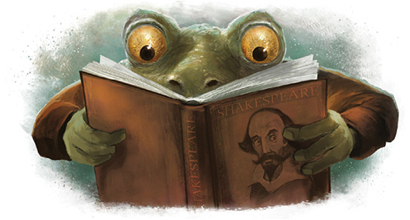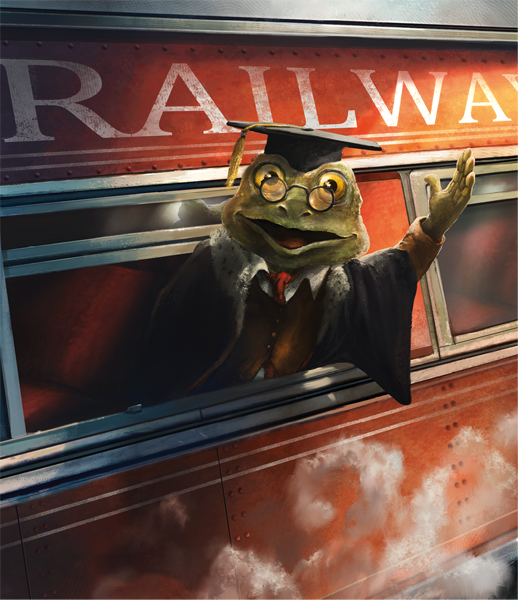
CHAPTER EIGHT
Toad the Genius

In which Toad’s enormous brainpower solves a great mystery of the universe.
Toad resurrected a large blackboard from the nursery and had it wheeled into the library, where he spent his time pondering life’s Great Big Questions (as Humphrey called them).
One morning, while still in his pajamas, Toad solved the thorny chicken-or-egg dilemma which had confounded deep thinkers for centuries. Over luncheon, he irrefutably calculated the number of angels who could dance on the head of a pin. During afternoon tea, he incisively proved the sound of one hand clapping.32
The next morning, he memorized the entire works of Shakespeare. That afternoon, he recited all of Hamlet by heart for a rapt audience of his friends, playing each of the parts, even poor, mad Ophelia, moving the Mole to tears with his spot-on interpretation of her floating down the river on her back like an otter, singing aquatic laments until the water soaked her brocade skirts and dragged her to a muddy end. That evening, he devised a surefire defense to the counter-Vronsky gambit in chess, which heretofore had been considered unbeatable. Just before bed, he indulged in the soothing mental exercise of memorizing the value of pi to seven hundred decimal places.
There seemed to be no intellectual area in which he did not excel. Humphrey attempted to measure his IQ, but the various tests wouldn’t go that high. The best estimate he could come up with was “really, really whopping.”
“Is there nothing he cannot do?” mused the Mole as he and the Rat trudged wearily home after another long evening of being assailed with endless lectures on the obscure theories, paradigms, and conjectures tumbling out of Toad’s fevered brain.
“Apparently not,” yawned the Rat. “There’s no doubt that a good deal of sense has been biffed into him, but perhaps too much, if you ask me. I, for one, am getting tired of feeling thick as a brick in his company. Whatever happened to our flannel-brained, boneheaded friend? Toady, of the simplest of simple minds. I do miss him.”
“I’ve asked Humphrey about it on the sly,” confessed Mole, “but he isn’t sure if this condition, this Puffin thingummy, is permanent or not. The first, er, victim, got so sick of being pestered about it that he ran away to live as a hermit in the Carpathian Mountains. Humphrey doesn’t know what happened to the others.”
“Probably run out of town by their friends after driving them all batty,” said Rat. “Why, even his poetry is better than mine—although I can’t bear to admit it—and he isn’t half trying! It’s just too much.”
Mole felt that he ought to reassure his friend on this score, since the Rat’s ditties were close to his heart. But in truth, even Mole (who had something of a tin ear when it came to verse) could tell that the Poffenbargered Toad’s poetry was of a much higher quality than the Rat’s. Being a wise and kind soul, however, Mole made no comment.
Word of Toad’s prodigious brainpower spread throughout the land. Letters of invitation from the great universities arrived, begging a visit from the erudite Mr. Toad. Cambridge, Oxford, Yale—how the clamor went up for the learned toad. Bushels of mail came daily, taxing the temper of the local postmouse no end.
* * *
Just after sunrise one morning, as Humphrey was rubbing the sleep from his eyes, he glanced out the window to see his uncle standing on the east lawn, holding what appeared to be a stopwatch and a plate of chocolate biscuits, speaking emphatically to a small rodent, an American woodchuck. Humphrey noticed a big pile of sticks between the two. Then the woodchuck, whom Toad had hired as his laboratory assistant for the day, began throwing—or “chucking”—sticks across the lawn as quickly as his tiny arms permitted, while Toad timed him with the stopwatch. The resulting paper, later published in the Proceedings of the Royal Society of Intense Philosophical Rumination and Exhaustive Cogitation, was a triumph. Humphrey, wide-eyed with admiration, read the rough manuscript pages as Toad scribbled them at breakfast and slid them down the long dining table:
HOW MUCH WOOD WOULD A WOODCHUCK CHUCK?
HARD DATA AT LAST
By A. Toad, Esq.
Since the dawn of time, the world’s deepest thinkers have struggled with the Woodchuck Chucking Dilemma (hereafter, WCD). I intend to settle the question once and for all; namely, can a woodchuck actually chuck wood and, if so, how much? The question calls for a Scientist with a thorough understanding of forestry, aerodynamics, and zoology. Members of the Royal Society, I stand before you as just such a Scientist.
Let us begin by setting one thing straight: not all wood can be chucked. An adult woodchuck, Marmota monax, weighs approximately 8 pounds and can hardly be expected to lift an average log, weighing 10 pounds, much less chuck it any significant distance. In addition, the typical Marmota, although of sturdy build, has comparatively short arms relative to his torso, making hurling activities that much more difficult. Perhaps this is why the WCD ends with the wistful caveat “if a woodchuck could chuck wood.”
Therefore, the first issue is to turn the typical log into smaller segments, i.e., kindling, of a size that the subject can grasp and throw. Once this is accomplished, the next obstacle turns out to be, quite unexpectedly, one of psychological motivation. If you simply ask the rodent to chuck kindling, even politely, you will get nothing but a few cheeky remarks for your trouble. However, offer the greedy blighter as many chocolate biscuits as he can eat, and you will get a markedly different result.
The details of this study are exceedingly complex and unbearably technical. Therefore, to avoid overtaxing the brains of millions of innocent readers, I proceed directly to the results.…33
* * *
Two weeks later, Toad made a surprise announcement at breakfast. “Well, it’s all decided,” he said, champing his kippers.34 “Based on my breakthrough Marmota paper, Cambridge University has offered me the Lumbago Endowed Chair of Extremely Abstruse Knowledge, a position that has been in existence for five hundred years. I’m to be Professor Toad, the Lumbagian Scholar of Trinity College! When I think of the role of the many great men who have held the chair before me, extending back into the mists of history, a mighty unbroken chain of sheer intellectual power … and when I realize that I, Toad, have been called to stand upon the shoulders of these giants, to share in their legacy, or even transcend it (for I am a toad without peer) … I’m overcome just thinking about it.”
He dabbed his eyes and said to Humphrey, “I’ve asked Mole and Ratty to keep an eye on you while I’m gone. And, of course, there’s the butler and Cook. And you have your experiments to keep you busy. But, for the moment, the tailor’s coming this afternoon to fit me with my cap and gown. The Lumbagian Scholar must have all the proper accoutrements of his office: a mortarboard, an ermine hood, a black gown lined with crimson silk.35 Quite the dashing rig, if I do say so myself. Most appropriate for a learned scholar of my preeminence.”
There followed a week of much busy preparation and packing of bags and trunks, and Ratty managed to talk his friend into taking the train, severely reminding him of the past scrapes he’d found himself in when he’d allowed himself close proximity to motor-cars. Toad—the new, improved, more sensible Toad—wisely agreed.
The big day came. The friends assembled at the station under a cloudless sky to bid adieu to Mr. Toad—now Professor Toad—togged out in his new gown, with his mortarboard tipped at a rakish angle. A new pair of tortoiseshell glasses added the final scholarly touch.
There was much fussing over the mountain of baggage, and double-checking of tickets, and triple-checking of tags, all the anxious dithering details that occupy the traveler while he waits for his train. Toad dispensed shillings to the youngsters in the crowd and pressed half crowns into the paws of the hard-working porters. A gaggle of juvenile stoats (who, for want of something better to do, slouched insolently against the station wall in the way adolescents will insist on doing) watched the proceedings, sneering when they thought no one was looking, and muttering rubbishy remarks when they thought no one was listening.
One of them had the audacity to mumble, “Where’s your big fat balloon now, Mr. Toad?” Another, egged on by the cheek of his comrade, added the scathing comment, “Yah!”
Fortunately, Toad did not hear these remarks. But the Mole, with his acute sense of hearing, heard them very well. He sent the louts packing with an indignant quiver of his whiskers and the threat of physical correction.
It was time for Professor Toad to bid them farewell and board the train. Hands were solemnly shaken, and shoulders were heartily clapped. More than one lip was noted to tremble during the sincere exchanges of bon voyage and good luck and promises to write weekly.
Toad boarded the train and leaned out his compartment window. “My dear friends,” he said, “my very dear friends. I shall miss you all most dreadfully, but a higher duty calls, to say nothing of fame and glory. I’m off to my rendezvous with Destiny! Humphrey, be a good boy and mind your elders.”

The guard waved his flag; the locomotive hissed and groaned and chuffed. The steam whistle let loose a silvery shriek, and the train slowly pulled away.
Rat and Mole and Humphrey stood on the platform and waved their handkerchiefs and shouted their good-byes until Toad disappeared around the bend. Then they turned and headed back home, each with that vague feeling of flatness one inevitably feels after waving a friend off on a journey that entails new horizons and novel adventures, leaving one behind in a smaller, staler world.
“Good old Toady,” said the Mole, wistfully. “The Riverbank won’t be the same without him. True, he could be an annoying toad at times, but he was our toad. Now he will be annoying other people. Ah, well.”
“I’ll miss Uncle Toad,” said Humphrey. “Just think, a member of my own family with Poffenbarger’s Syndrome. It’s too exciting for words.”
They spied Badger leaning against the back of the station house, smoking a pipe in the shadows. Apparently he had been there all along.
“Hullo, Badger,” said Rat, with some surprise. “Toad just left for Cambridge. Did you see him go?”
Badger nodded gravely and drew on his pipe. “He’s probably the stupidest genius that ever lived. And even though it’s a mistake for a Riverbanker to go out into the Wide World, Cambridge might be the right place for him. From what I hear, it’s just about the only spot in England where the inhabitants are as puffed up as he is. Oh, and there’s Oxford, of course.”
“Did you ever in your life,” mulled the Rat, “think we’d see such an odd event? I’d have bet my own granny’s pelt against it.” He thought some more. “Five to one.”